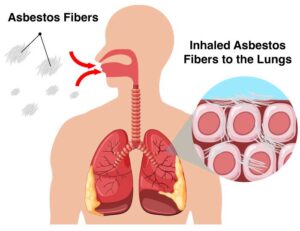Diseases Caused by Asbestos
Asbestos can cause serious illnesses that develop 20-50 years after the inhalation or ingestion of asbestos fibers. These fibers can also result in fluid and plaque buildup over time.
 Asbestos diseases include:
Asbestos diseases include:
- Asbestosis
- Interstitial Fibrosis
- Lung Cancer
- Mesothelioma
- Pleural Diseases (Effusions, Plaques, etc.)
Many companies knew that asbestos was dangerous to humans. However, they hid this information from the general public and chose to put their profits over the health and safety of employees and consumers.
Sokolove Law has decades of experience pursuing justice for those who were harmed by these companies. If you or a loved one developed an asbestos-related disease, you may be eligible to receive financial compensation.
Billions Recovered Nationwide
At Sokolove Law, we’ve recovered over $5.1 Billion for thousands of asbestos exposure victims and their families nationwide. Let us get you the results you deserve.
Asbestos-Related Disease List
Mesothelioma
Mesothelioma is a rare yet aggressive cancer caused by exposure to asbestos. While there is no cure, treatments are available to help manage symptoms and alleviate pain.
There are multiple types of mesothelioma, including:
- Peritoneal mesothelioma, which forms in the lining of the abdomen
- Pericardial mesothelioma, which forms in the lining of the heart
- Pleural mesothelioma, which forms in the lining of the lungs
- Testicular mesothelioma, which forms in the lining of the testes
Since the early symptoms of mesothelioma are similar to those of common illnesses, this cancer often goes undetected until it has reached a more advanced stage.
If you have any history of asbestos exposure, it is important to be aware of the signs and symptoms of mesothelioma.
If you've been diagnosed with mesothelioma, the odds are fairly good it's not your fault. It wasn't from your tobacco smoking habit if you had one, and it wasn't from any other vice you can think of.
It was probably because you were exposed to asbestos in your job. That's likely how, you know, the vast majority of our clients are exposed.
Because it's not your fault and it should never have happened to you, you have a right to make a claim against the folks who knew it was gonna happen to you and did nothing about it. The average worker did not know that it was dangerous.
But the reason why we're able to bring claims against the manufacturers who used asbestos in their products is because they knew it was dangerous.
If you or a loved one has been diagnosed with mesothelioma, Sokolove Law is here to help. Call us today.
Lung Cancer
Lung cancer is a relatively common form of cancer that accounts for nearly 25% of all cancer deaths.
There are multiple causes of lung cancer, with asbestos — a known carcinogen — being one of them.
Symptoms of asbestos lung cancer include:
- Chest pain
- Fatigue
- Persistent cough
- Phlegm
- Shortness of breath and lack of oxygen
While mesothelioma develops in the lining of the lungs, asbestos lung cancer develops directly in the lungs themselves. It can quickly spread to other organs around the body.
Asbestosis
Asbestosis, or diffuse pulmonary fibrosis, is a lung disease caused by the inhalation of asbestos fibers. Though asbestosis is not cancerous, it has no cure and can be deadly if left unchecked.
When asbestos fibers get stuck in the lung, they cause damage and scarring. This damage makes it much harder for the lung to operate.
Common symptoms of asbestosis include:
- Chest pain
- Loss of appetite leading to weight loss
- Shortness of breath
Long-term deterioration from asbestos fibers harden the affected person’s lungs. This can deprive them of oxygen and eventually suffocate them.
In some cases, lung deterioration can cause other health effects or illnesses to arise. Asbestosis may lead to heart failure or mesothelioma.
Gastrointestinal Cancers
In addition to mesothelioma and lung cancer, asbestos can also cause several types of gastrointestinal cancers.
Gastrointestinal cancers include:
- Colon cancer
- Esophageal cancer
- Rectal cancer
- Stomach cancer
While there are many types of asbestos cancers, these gastrointestinal cancers develop when asbestos fibers are ingested rather than inhaled. This causes them to become lodged in the digestive tract instead of the lungs.
Interstitial Fibrosis


These disorders are characterized by scarring of the tissue between the air sacs in the lungs, which is often caused by exposure to dangerous airborne materials like asbestos.
There are two main signs and symptoms of interstitial fibrosis:
- Dry cough
- Shortness of breath at rest or aggravated by exertion
Once lung scarring occurs, it’s usually considered to be irreversible. While some medications may slow the damage of interstitial fibrosis, many people never regain full function of their lungs.
Depending on the exact disorder, lung transplants may be an option for those suffering from interstitial fibrosis.
Pleural Effusions
While not technically a disease, a pleural effusion is a buildup of fluid in the lung lining. This condition develops when pressure is put on the lung lining, which makes the blood vessels leak fluid.
Common symptoms of pleural effusions include:
- A persistent, worsening cough
- Chest pain
- Collapse of the lung
- Fever
- Shortness of breath and difficulty breathing
Pleural effusions can be treated by doctors with relative ease. Doctors will often insert a needle into the chest wall and drain the fluid. They may also inflame the pleura, which will encourage it to seal and stop fluid from entering.
Without treatment, the fluid can become infected and lead to death.
Pleural effusions are found in 90% of pleural mesothelioma cases. Doctors consider them to be an important early sign of that cancer. However, pleural effusions can also be caused by asbestosis. Doctors can analyze the fluid using a biopsy to see if it is a sign of cancer.
Pleural Plaque
A pleural plaque is a chalky, calcium-based material that builds upon the lining of the lungs. Pleural plaques are the most common form of pleural disease associated with asbestos exposure.
This disease typically has no physical symptoms, and as a result, it does not require treatment. At this time, there is no proven link between pleural plaques and more serious asbestos-related lung diseases.
However, some studies have suggested it may lead to an increased risk of mesothelioma.
Get Help Paying for Treatment
Our asbestos lawyers can fight on your behalf for the compensation you need. Take the first steps toward justice now.
How Does Asbestos Cause Disease?
There are many different asbestos-related diseases. However, they all share a common cause: long-term damage from asbestos fibers.
Asbestos was an important building material because it was cheap, non-flammable, and extremely strong. However, it can easily crumble and release fibers into the air.
When these microscopic fibers become airborne, humans can inhale or ingest them without notice.
Asbestos fibers cannot be broken down by the human body, so the fibers irritate healthy tissue within the body for decades. This can lead to abscesses, fluid buildup, and scarring in the affected areas. Over time, this chronic irritation also causes diseases.
What disease a person develops depends on a few factors, including:
- Type of asbestos they were exposed to
- Location the asbestos fibers settle in their body
- If the asbestos damage leads to cellular mutations
At Sokolove Law, we recognize how difficult and confusing an asbestos-disease diagnosis can be.
Our asbestos and mesothelioma attorneys can discuss potential asbestos exposure sites, treatment options, and financial assistance to help determine how to move forward.
Call Sokolove Law right now at (800) 647-3434 if you’ve been diagnosed with mesothelioma or another asbestos-related disease.
Financial Help for Asbestos Diseases
Medical bills for many asbestos-related diseases can pile up quickly, and intense symptoms often leave people unable to work.
Luckily, compensation may be available to help lessen the financial burden of your disease. Learn more about the different options that may be available to you.
Asbestos Lawsuits
Many asbestos-related companies knew about the dangers of asbestos decades ago, but they chose to conceal this information and put their profits over the health of their employees and consumers.
Sokolove Law can help you file an asbestos lawsuit against these companies by:
- Determining your eligibility to file a lawsuit through a free case review
- Gathering information and evidence about your asbestos exposure
- Filing your lawsuit in the correct court before the mandated deadlines
- Negotiating an asbestos settlement with the defendant(s) on your behalf
- Presenting your case before a judge or jury if a settlement cannot be reached
Average Mesothelioma Settlement Amount
The vast majority of our asbestos exposure lawsuits result in a settlement, allowing clients to receive much-needed compensation sooner.
Asbestos Trust Funds
After facing numerous lawsuits, many manufacturers of asbestos-containing products filed for bankruptcy.
However, courts required these companies to set aside money in asbestos trust funds for future victims of asbestos-related diseases.
Estimated Amount in Asbestos Trust Funds
Sokolove Law can help you determine which companies may be responsible for your asbestos exposure. We can then file asbestos claims with any trusts established by these companies.
Filing an asbestos trust fund claim does not require you to set foot in court. Many clients have started getting money in as few as 90 days — sometimes from multiple trusts.
VA Benefits for Asbestos-Related Diseases
Veterans with mesothelioma or other asbestos-related diseases may be able to access healthcare and financial compensation through the VA if they were exposed to asbestos during their service.
VA Monthly Payment for Mesothelioma, Plus Free Health Care
Our VA-accredited lawyers can help prove when and where your exposure to this toxic mineral took place so that you are able to access the VA benefits you deserve.
You may be eligible for compensation that we can fight for on your behalf. Get the help you deserve now.
Sokolove Law: Legal Assistance for Asbestos Illnesses
At Sokolove Law, we have recovered over $5.1 Billion for injured clients across the country through asbestos litigation cases.
Our nationwide law firm has over 45 years of experience working with victims of asbestos exposure to hold asbestos-related companies accountable for their actions.
Let us help you and your family pursue justice and compensation through all of the avenues available to you, which may include asbestos trust funds, lawsuits, and VA benefits.
Call Sokolove Law at (800) 647-3434 or fill out our contact form today to learn if you may be eligible for financial compensation. Our dedicated team is standing by to help you 24/7.
Asbestos Lung Disease FAQs
What are the 4 major asbestos-related diseases?
The 4 major asbestos-related diseases are:
- Asbestosis
- Lung cancer
- Mesothelioma
- Pleural disease
Asbestos exposure can also cause additional diseases. If you or a loved one were exposed to asbestos, even if the exposure took place decades ago, it is important to discuss any changes in your health with your physician.
What is asbestos poisoning?
Asbestos poisoning occurs when asbestos fibers are inhaled or ingested. Asbestos is a toxic mineral that can cause serious, even fatal, diseases to develop in humans.
The body is unable to break these fibers down, so they remain in the body for decades and cause irritation to healthy tissue.
Eventually, cancer and other severe health issues can develop as a result.
Can asbestos cause asthma?
Studies on asbestos’s link to asthma are not yet conclusive. A study in the American Journal of Respiratory and Critical Care Medicine reported that asbestos exposure may be a risk factor for the development of bronchial asthma, yet studies prior to this determined the opposite.
Because asbestos-triggered diseases can affect a person’s breathing, initial diagnoses can be challenging. Symptoms of asbestosis and mesothelioma often resemble those of asthma and pneumonia.
Does asbestos cause COPD?
Asbestos can cause COPD. Chronic obstructive pulmonary disease, or COPD, is a lung disease that most commonly refers to chronic bronchitis and emphysema.
In most cases, COPD is caused by smoking, but the disease can be triggered by environmental toxins such as abundant pollution, chemical fumes, and exposure to asbestos and silica dust.
Because the use of asbestos was so widespread in industrial workplaces around the U.S., many workers have inhaled asbestos fibers and gone on to develop lung cancer, mesothelioma, asbestosis, and COPD.
How does asbestos affect the body?
Asbestos can affect the body in a number of ways. Once inhaled or ingested, this fibrous mineral can cause an irritating or inflammatory reaction inside the body.
Typically, asbestos fibers attack the body’s mesothelium, which is the thin, protective tissue that surrounds one’s internal organs, including the heart, lungs, and abdomen.
Over time, typically between 20-50 years, scarring can develop on these tissues and ultimately cause cancer, including mesothelioma and lung cancer.
Is asbestos really dangerous?
According to the World Health Organization (WHO), all 6 forms of asbestos are known carcinogens and can be extremely dangerous to the health and wellbeing of humans.
Getting exposed to asbestos and breathing in or ingesting its fibers can lead to an array of diseases and cancers, including:
- Asbestosis
- Lung cancer
- Mesothelioma
- Ovarian cancer
- Testicular cancer
Can asbestos kill you?
In some instances, yes. Exposure to asbestos can cause chronic diseases that often don’t have a cure and can lead to death.
When asbestos fibers are inhaled, they build up in the lining of the lungs, heart, and chest and the body is unable to break them down.
The most dangerous form of disease caused by asbestos exposure is mesothelioma, a rare cancer.
According to the Centers for Disease Control and Prevention (CDC), almost 3,000 people each year are diagnosed with malignant mesothelioma. This makes up 0.02% of cancer cases in the U.S.
Can asbestos cause pneumonia?
No. While asbestos exposure can harm lung cells and cause various diseases of the lungs, respiratory infections such as pneumonia are caused by bacteria, viruses, and fungi.
Does asbestos make you cough?
Asbestos will not make you cough or sneeze at first exposure. In fact, most people are unable to tell whether asbestos is harming their lungs until symptoms develop decades after they are first exposed.
If a patient develops an asbestos disease such as pleural effusions or mesothelioma (a rare cancer caused by asbestos exposure), they will eventually experience symptoms such as coughing, shortness of breath, and chest pain.
Is asbestosis cancer?
No. Asbestosis is a lung disease that is noncancerous. However, asbestosis can eventually cause lung cancer or mesothelioma to develop.

